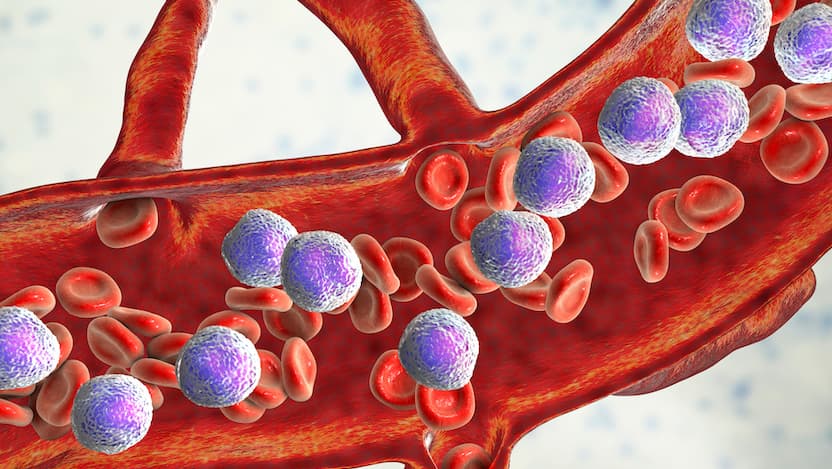Myeloid mutations associated with high-risk adult acute lymphoblastic leukemia

Scientists previously thought mutations in myeloid genes could only cause myeloid cancers such as myelodysplastic syndrome (MDS) or acute myeloid leukemia (AML) — hence the name given to these genes. However, a recent study led by researchers at the University of Chicago Medicine revealed that myeloid mutations can also cause high-risk acute lymphoblastic leukemia (ALL) and that ALL patients with these mutations require non-standard treatment.
Disease pathology differs between adult ALL and pediatric ALL
ALL is most common in children and young adults between 18 and 40 years of age. While 90% of ALL patients in this pediatric and young adult population typically respond well to treatment and recover, the rarer patients over age 40 have a poor prognosis.
This difference in prognosis prompted scientists to question whether ALL pathology might differ between the two populations and, if so, whether a better treatment regimen for older adults is required.
“We discovered that a large proportion of older adults with ALL harbor myeloid gene mutations in their disease. These myeloid mutations were associated with inferior response to standard ALL chemotherapy. Therefore, we hypothesized that ALL with myeloid mutations is a unique entity and may need to be treated differently,” said oncologist Caner Saygin, MD, Assistant Professor of Medicine at UChicago Medicine and a corresponding author on the recent paper.
One-third of adult ALL patients have myeloid mutations
The UChicago Medicine researchers, in collaboration with other renowned cancer centers, conducted a comprehensive genetic profiling of 400 adult ALL cases to look at the mutations in various cell types and characterize them at high resolution via leading-edge, single-cell sequencing technologies.
The sequencing data in Saygin's adult ALL cohort revealed that 33% of adult ALL patients harbor myeloid mutations. These patients did not respond well to standard chemotherapy, but newer immunotherapy-based approaches proved effective. The data indicate the importance of identifying myeloid mutations in ALL in order to guide therapy for adult patients.
The more CHIP mutations, the higher the chances of ALL in adults
Hematopoietic stem cells in bone marrow produce billions of new blood cells every day via a process called hematopoiesis. During this rapid cell production, DNA mutations sometimes arise.
The presence of DNA mutations in an individual's blood cells – in the absence of an overt blood cancer – is called clonal hematopoiesis of indeterminate potential (CHIP). Most of these mutations involve myeloid genes, and they accumulate with age. Therefore, the prevalence of CHIP is much higher in older adults compared to young adults.
Saygin and his colleagues showed that myeloid mutations were present years before the diagnosis of ALL. This observation came from single-cell sequencing of bone marrow samples from myeloma patients whose myeloma was in remission at the time of sample collection.
Abnormal cells containing myeloid CHIP mutations went on to cause ALL many years after they were first detected in the bone marrow.
“We knew CHIP can be found in more than 10% of individuals at age 50 and above, and these people are at higher risk of developing MDS or AML. What we didn't know was that it had the potential to cause acute lymphoblastic leukemia, which is a lymphoid disease,” Saygin said. “Our findings expand the spectrum of health problems that CHIP can lead to and can also offer an opportunity for early detection and prevention. That is our overarching goal and our focus in our CHIP Clinic at the UChicago Medicine.”
Chemotherapy and radiotherapy increase the rate of myeloid mutations and the risk of developing therapy-related ALL. Because of this increased risk, physicians offer regular assessments even after the cancer is in complete remission. The role of CHIP in adult ALL remained undiscovered until now because most studies did not focus on ALL in older adults.
“Our dedicated adult CHIP clinic at UChicago Medicine and collaboration with high-volume ALL centers have enabled us to do a very comprehensive molecular characterization of adult ALL,” Saygin said.
“We need novel therapies that are more specifically targeted to ALL with myeloid mutations. In our research lab, we are developing new mouse models to understand the biology of this disease, and studying patient samples to conduct drug screenings that can lead to the development of new drugs for adult ALL.”
The study, “Acute lymphoblastic leukemia with myeloid mutations is a high-risk disease associated with clonal hematopoiesis,” was supported by grants from the National Institutes of Health, the National Cancer Institute, the Department of Defense, the American Society of Hematology, the Prevent Cancer Foundation and the Leukemia & Lymphoma Society.
Additional authors from the University of Chicago include Pankhuri Wanjari, Peng Wang, Angela Lager, Carrie Fitzpatrick, Jeremy Segal, Sandeep Gurbuxani, Girish Venkataraman, Jason Cheng, Bart Eisfelder, Anand Patel, Olatoyosi Odenike, Richard Larson, Lucy Godley, Daniel Arber, and Wendy Stock; Pu Zhang, Mehdi Gharghabi, Rosa Lapalombella from The Ohio State University, Columbus, Ohio; Jacob Stauber, Oliver Bohorquez, John Greally, Ulrich Steidl from Albert Einstein College of Medicine-Montefiore Health System, The Bronx, New York; Ibrahim Aldoss, Guido Marcucci from City of Hope, Duarte, Calif.; Adam Sperling, Marlise Luskin, Lachelle Weeks, Christopher Gibson, Nikhil Munshi, Benjamin Ebert from Dana-Farber Cancer Institute, Boston; Todd Knepper, Bijal Shah from Moffitt Cancer Center, Tampa, Fla.; and Sheethal Umesh Nagalakshmi and Savita Jayaram from MedGenome, San Francisco.
